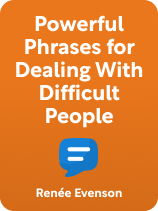

This article is an excerpt from the Shortform book guide to "Powerful Phrases for Dealing With Difficult People" by Renee Evenson. Shortform has the world's best summaries and analyses of books you should be reading.
Like this article? Sign up for a free trial here.
Have you ever found yourself in a situation where you just can’t see eye to eye with someone? How do you maintain a positive relationship when faced with an unresolvable conflict?
In her book Powerful Phrases for Dealing with Difficult People, Renée Evenson offers practical advice for handling disagreements that seem impossible to resolve. She provides strategies for affirming relationships, accepting situations, and explaining decisions when conflicts arise.
Read on to discover how to navigate unresolvable conflicts while preserving important relationships in both personal and professional settings.
Unresolvable Conflict
Evenson notes that, in situations where the two of you are unable to communicate effectively or find a mutually acceptable agreement, you may have to give up on achieving a win-win outcome. Sometimes you’re just stuck with an unresolvable conflict. In this case, it’s important to still affirm the relationship. This helps you maintain a collaborative relationship even if you can’t see eye to eye on this particular issue. Say something like, “It’s too bad we couldn’t settle this disagreement, but I’m sure we’ll still be able to do great work together.”
(Shortform note: It might be hard to genuinely affirm your relationship with someone if you deeply dislike them. To encourage yourself to like them more, try to intentionally counteract your mental bias of confirming what you already think about them. When you frequently think about someone’s annoying habits and unlikable qualities, you’ll naturally notice those traits more often, leading you to dislike that person more. Instead, focus on their skills and qualities you can appreciate—everybody has some.)
If you don’t have the authority to resolve the issue without the other person’s help, you may need to simply accept things as they are and get used to it. Alternatively, in the workplace, you could present your case to someone in a position of authority and get them to intervene. Evenson asserts that this should be a last resort—leaving the person you disagree with out of the conversation might damage your relationship with them.
(Shortform note: If you decide to talk to your boss about your co-worker’s behavior, make sure to use the same mature strategies that you would if you were discussing it with your co-worker: Explain what specific behavior you want to change, how it makes you feel, and the consequences it has on your work—all without accusing or blaming them. If your boss refuses to intervene, you may be able to make peace with the situation by trying to learn something from it, so it doesn’t feel like a total loss.)
On the other hand, it’s possible that you have the authority to resolve the issue in a way you believe is best, but that the other person doesn’t like. In this case, Evenson recommends respectfully explaining the reasoning behind your final decision to the other person. This way, even if they disagree, they’ll have more respect for your decision-making process. This will leave them more likely to make peace with your decision and maintain a strong relationship with you.
For example, imagine you’re the founder of a startup. After a deep discussion, you decide to move forward with a certain marketing strategy, even though your COO believes it’s suboptimal. You explain that although they raise valid concerns, preliminary research shows that the marketing strategy would be successful, so you’re going to try it out for a couple of months. This reasoned explanation motivates the COO to respect your leadership and continue doing their best work for the company, even if they still think your marketing strategy is a mistake.
(Shortform note: In Trillion Dollar Coach, Eric Schmidt, Jonathan Rosenberg, and Alan Eagle contend that the most convincing way to justify your decision is to connect it to your organization’s core guiding principles. If you can explain how your decision furthers the organization’s reason for existing, the other person will hopefully understand why you feel you have to disagree with them.)

———End of Preview———
Like what you just read? Read the rest of the world's best book summary and analysis of Renee Evenson's "Powerful Phrases for Dealing With Difficult People" at Shortform.
Here's what you'll find in our full Powerful Phrases for Dealing With Difficult People summary:
- The downsides of avoiding conflict
- How to keep people from getting defensive
- What to do before you attempt conflict resolution






